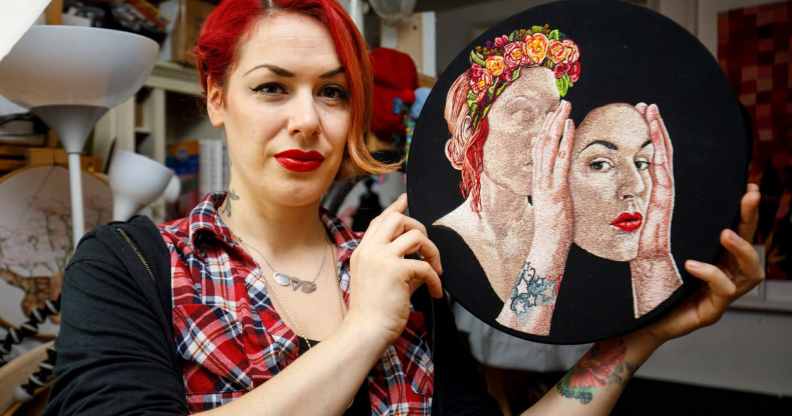Royal Academy of Arts apologises for pulling ‘transphobic’ artist Jess de Wahls’ work

Artist Jess de Wahls. (AFP via Getty/ TOLGA AKMEN)
The Royal Academy of Arts has apologised to artist Jess de Wahls after pulling her work from its gift shop over her ‘transphobia’.
Last week, the top London art gallery pulled its stock of embroidered patches designed by de Wahls from its shop after it was alerted by social media users to her history of anti-trans comments.
In 2019, De Wahls wrote a post for her blog titled “somewhere over the rainbow, something went terribly wrong”, in which she described trans women as “biological males that choose to live as a woman, or believe they actually are women” and compared affirming a trans person’s identity to “facilitating the suicide” of someone with severe depression.
She also said trans kids come out because of a “social incentive”, that affirming them and providing necessary healthcare was akin to “neglecting safeguarding duties”, and even said that “proponents of the doctrine” of trans rights were “predominantly groups of biological males threatening actual violence against women, with weapons”.
The Royal Academy initially thanked social media users for highlighting the “transphobia”, and declared it would never “knowingly support artists who act in conflict” with its values of “equality, diversity and inclusion”.
In response, the artist doubled down on her “transphobia”, tweeting a link to her 2019 blog post, and writing: “Time to re-share my views. I stand by everything I wrote.”
However, following a barrage of criticism from so-called “gender critical feminists”, and news that de Wahls was considering legal action, the gallery has now backtracked.
In a statement on Wednesday (23 June), it said: “One thing is clear to us now – we should have handled this better. We have apologised to Jess de Wahls for the way we have treated her and do so again publicly now.
“We had no right to judge her views on our social media. This betrayed our most important core value – the protection of free speech.”
The statement continued: “These events raise some fundamental issues.
“Freedom of expression can open up debate, create empathy or respect for difference, it can also at times cause hurt and outrage.
“This has confirmed to us our commitment to freedom of expression and to addressing complex issues through engagement and debate.”
The Royal Academy said it would “reopen discussions” with Jess de Wahls about restocking her work.

